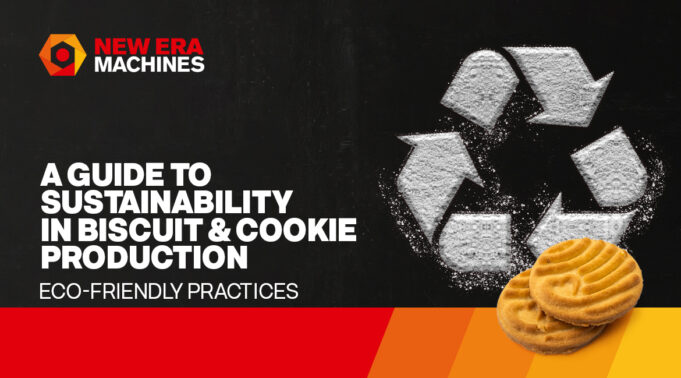In the world of delectable treats, biscuits, crackers and cookies hold a special place, satisfying our taste buds with their delightful crunch and sweet taste. As the demand for these lip-smacking delights continues to rise, so does the need for sustainable and eco-friendly practices in their production. From ingredient sourcing to packaging, the biscuit and cookie industry is rapidly embracing environmentally-conscious approaches to not only satisfy taste buds but also minimize its ecological & carbon footprint.
In this blog, we deep dive into the world of sustainability, exploring the innovative ways biscuit, cracker and cookie line manufacturers are adopting eco-friendly practices without compromising on taste and quality. Without wasting much time, let’s look at the individual parts from start to end:
Part 1: Sourcing Sustainable Ingredients
The journey to eco-friendly biscuit and cookie production begins with sourcing ingredients that are not only of high quality but also sustainable. Here’s how manufacturers are making a difference:
Organic Ingredients: Opting for organic ingredients ensures that the crops are grown without synthetic pesticides or fertilizers, promoting healthier ecosystems and reducing harm to surrounding environments.
Local Sourcing: Choosing local suppliers for ingredients reduces the carbon footprint associated with transportation and supports local businesses.
Fair Trade Practices: Using ingredients sourced through fair trade practices ensures that farmers receive fair & due compensation for their products and it also encourages responsible farming techniques.
Part 2: Evolving Production Processes
Biscuit and cookie manufacturers are rethinking their production processes to minimize waste and energy consumption:
Efficient Energy Use: Incorporating energy-efficient equipment and technologies, such as ovens with optimized heat distribution and power-saving lighting, reduces energy consumption during production.
Water Conservation: Implementing water-saving technologies, like recirculating water in the oven chambers and efficient cleaning practices, significantly reduces water waste.
Reducing Packaging Waste: Manufacturers are adapting minimalist packaging designs, using recyclable materials, and reducing excess packaging to minimize waste.
Part 3: Innovations in Recipe Formulation
The heart of any delicious biscuit or cookie lies in its recipe. Manufacturers are exploring creative ways to make their recipes not only delicious but also sustainable:
Plant-Based Ingredients: Incorporating plant-based ingredients, such as nut flours and alternative sweeteners, not only caters to a wider range of diets but also reduces the ecological impact of animal agriculture.
Reducing Food Waste: Some manufacturers are reusing ingredients that might otherwise be discarded, such as using fruit peels for natural flavourings or including surplus grains.
Part 4: Eco-Friendly Packaging
Packaging plays a significant role in the sustainability of biscuit, crackers and cookie products. Manufacturers are adopting eco-friendly packaging solutions:
Recyclable Materials: Switching to recyclable materials, such as paper-based packaging, reduces the amount of plastic waste that ends up in landfills or oceans.
Biodegradable Packaging: Some manufacturers are also opting for biodegradable materials, ensuring that their packaging breaks down naturally and doesn’t contribute to long-term environmental pollution.
Simplified & Minimalist Designs: Simplifying packaging designs not only reduces waste but also emphasizes the product’s natural appeal, creating a more authentic and appealing product image in the minds of the consumer.
Part 5: Transportation and Distribution
Sustainability doesn’t stop at production; it extends to transportation and distribution too:
Optimized Routes: Manufacturers are adopting optimized transportation routes to minimize fuel consumption and greenhouse gas emissions.
Bulk Shipping: Bulk shipping reduces the number of trips required to transport products, further lowering emissions and transportation costs.
Part 6: Consumer Empowerment and Sustainable Choices
The final part deals with consumer awareness, empowerment & making a wide set of healthy choices available in fostering a greener & cleaner future:
Clear Labelling: Transparent labelling informs consumers about the eco-friendly practices adopted by manufacturers, helping them make conscious purchasing decisions.
Reduced Portion Sizes: Offering smaller portion sizes encourages mindful consumption and reduces food waste. It also greatly helps in the calorie consumption of the consumers.
Some Last Words
The biscuit, cracker and cookie or bakery industry is undergoing a transformation towards a more sustainable future. From sourcing organic ingredients to adopting energy-efficient production processes, and eco-friendly packaging solutions, manufacturers are stepping up to reduce their environmental impact while delivering delicious treats. As consumers, we also play a significant role in driving change by making eco-conscious choices. By supporting companies that prioritize sustainability and by making informed purchasing decisions, we contribute to a brighter, greener, and more flavourful world.
In this backdrop, it is pivotal to place trust in a reputed & renowned manufacturer who possesses the required skill & expertise in engineering such machines. One name that comes to mind, is of New Era Machines, India’s leading biscuit, cookie & cracker production line manufacturer. With an experience spanning over 6 decades, they deliver the perfect combination of technology & experience. Their turnkey production lines ensure biscuit production in a reliable, efficient & eco-friendly manner. Do give their advanced machinery a try & let us know about the results you got.







